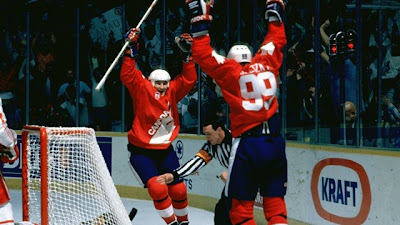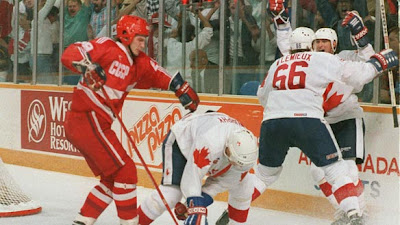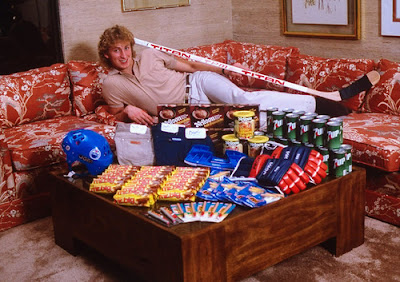Showing posts with label Wayne Gretzky. Show all posts
Showing posts with label Wayne Gretzky. Show all posts
Thursday, August 8, 2013
Wayne Gretzky Was Almost a Winnipeg Jet
The Trade that shocked the hockey world happened 25 years ago,
ripping Wayne Gretzky from Edmonton and forever making Peter Pocklington a pariah in the City of Champions. But there exists an alternate
universe where Wayne Gretzky was never traded from Edmonton—because he
was a Winnipeg Jet.
In Peter Gzowski's best-selling classic The Game of Our Lives, which follows the 1980-81 Edmonton Oilers, a team on the brink of becoming a dynasty, Gzowski tells a story of how Wayne Gretzky was almost traded to the Winnipeg Jets instead of the Edmonton Oilers. The deal never happened because Jets owner Michael Gobuty wasn't a bolder backgammon player.
In Peter Gzowski's best-selling classic The Game of Our Lives, which follows the 1980-81 Edmonton Oilers, a team on the brink of becoming a dynasty, Gzowski tells a story of how Wayne Gretzky was almost traded to the Winnipeg Jets instead of the Edmonton Oilers. The deal never happened because Jets owner Michael Gobuty wasn't a bolder backgammon player.
Thursday, September 13, 2012
Retro Diary: Canada Cup Final 1987 - Game 3
It all came down to this. Canada vs. the Soviet Union. At stake? Only world domination (at least on the ice).
Canada got off to a rocky start and initially looked like they were on the verge of being blown out. But a little bit of Canadian gumption helped the team pick themselves off the mat and eventually back into the game.
Like the other two games in the series, game three was a classic, and goes down in history as one of the best hockey games of all time.
Canada got off to a rocky start and initially looked like they were on the verge of being blown out. But a little bit of Canadian gumption helped the team pick themselves off the mat and eventually back into the game.
Like the other two games in the series, game three was a classic, and goes down in history as one of the best hockey games of all time.
Wednesday, September 12, 2012
Retro Diary: Canada Cup Final 1987 - Game 2
After losing a shocker to the Soviets in Montreal, Team Canada traveled west to Hamilton for Game 2 of the 1987 Canada Cup Final.
The team was battling the injury bug, with only 10 regular forwards in the lineup. It got to the point that defenceman James Patrick was being used up front.
But like every smart coach before him, Mike Keenan went to his big guns to pull out the victory. He sent Wayne Gretzky and Mario Lemieux over the boards every chance he got, basically running them into the ground.
It was a wild back-and-forth affair that took two overtimes to solve. After the game Gretzky would tell reporters that it was the most physically and mentally draining game of his life.
The team was battling the injury bug, with only 10 regular forwards in the lineup. It got to the point that defenceman James Patrick was being used up front.
But like every smart coach before him, Mike Keenan went to his big guns to pull out the victory. He sent Wayne Gretzky and Mario Lemieux over the boards every chance he got, basically running them into the ground.
It was a wild back-and-forth affair that took two overtimes to solve. After the game Gretzky would tell reporters that it was the most physically and mentally draining game of his life.
Tuesday, September 11, 2012
Retro Diary: Canada Cup Final 1987 - Game 1
The Summit Series in 1972 is one of the defining moments in Canadian history.
In many ways it was more than a simple hockey series, it was a battle between communism and capitalism. It was a battle between two very different ways of life.
The Iron Curtain shrouded the USSR in mystery, which led many in Canada to severely underestimate the Soviets' ability, which was evident by the total shock the reverberated from coast to coast after the 7-3 drubbing Canada received in the opening game.
Eventually, thanks largely to Paul Henderson, Phil Esposito, and a tomahawk chop from Bobby Clarke, Canada prevailed, although the myth of Canadian superiority was shattered. In addition to showing the talent gap between East and West was miniscule, the series made it apparent that not all of the best players in the world were in the NHL.
The success of the Summit Series led to demand for a true world championship of hockey, which eventually led to the creation of the Canada Cup in 1976. That year both Bobby Orr and Bobby Hull, two players who were forced to miss the Summit Series for various reasons, helped Canada capture the tournament's inaugural championship.
The Soviet Union won the next edition in 1981, with a 8-1 drubbing of Canada in the final. It was a national embarrassment, and one that was only slightly avenged in 1984 as Canada eliminated the Soviet Union in the semifinal, before defeating Sweden for the gold.
Nothing could compete with the tournament in 1987, however. Canada met the Soviet Union in the final, which Wayne Gretzky described as "the biggest thing since '72." The two hockey super-powers had another chance to determine who was the greatest hockey playing nation on Earth. More importantly, the tournament marked the first and only time that Mario Lemieux and Wayne Gretzky, the two greatest hockey players ever, donned the same uniform. The pair didn't disappoint.
Besides Gretzky and Lemiuex, Team Canada boasted nine other Hall of Famers, including Mark Messier, Paul Coffey, and Ray Bourque. The team was so stacked that players like Al MacInnis, Patrick Roy, and Steve Yzerman didn't make the team. It might just be the greatest collection of hockey players ever assembled.
TSN is replaying the classic final (Sept. 11, 12, and 13 at 7:30 PM ET) and it is definitely worth the watch. It might just be the best series in the history of hockey. It's also pretty easy to find on YouTube if you don't want to wait. And if you want to own a piece of hockey history yourself, it is also available on DVD.
Over the next three days I will have a three-part series recapping each game in detail. Here is a running diary of the classic first game, in which the Soviets stunned Canada and put them on the brink of elimination.
In many ways it was more than a simple hockey series, it was a battle between communism and capitalism. It was a battle between two very different ways of life.
The Iron Curtain shrouded the USSR in mystery, which led many in Canada to severely underestimate the Soviets' ability, which was evident by the total shock the reverberated from coast to coast after the 7-3 drubbing Canada received in the opening game.
Eventually, thanks largely to Paul Henderson, Phil Esposito, and a tomahawk chop from Bobby Clarke, Canada prevailed, although the myth of Canadian superiority was shattered. In addition to showing the talent gap between East and West was miniscule, the series made it apparent that not all of the best players in the world were in the NHL.
The success of the Summit Series led to demand for a true world championship of hockey, which eventually led to the creation of the Canada Cup in 1976. That year both Bobby Orr and Bobby Hull, two players who were forced to miss the Summit Series for various reasons, helped Canada capture the tournament's inaugural championship.
The Soviet Union won the next edition in 1981, with a 8-1 drubbing of Canada in the final. It was a national embarrassment, and one that was only slightly avenged in 1984 as Canada eliminated the Soviet Union in the semifinal, before defeating Sweden for the gold.
Nothing could compete with the tournament in 1987, however. Canada met the Soviet Union in the final, which Wayne Gretzky described as "the biggest thing since '72." The two hockey super-powers had another chance to determine who was the greatest hockey playing nation on Earth. More importantly, the tournament marked the first and only time that Mario Lemieux and Wayne Gretzky, the two greatest hockey players ever, donned the same uniform. The pair didn't disappoint.
Besides Gretzky and Lemiuex, Team Canada boasted nine other Hall of Famers, including Mark Messier, Paul Coffey, and Ray Bourque. The team was so stacked that players like Al MacInnis, Patrick Roy, and Steve Yzerman didn't make the team. It might just be the greatest collection of hockey players ever assembled.
TSN is replaying the classic final (Sept. 11, 12, and 13 at 7:30 PM ET) and it is definitely worth the watch. It might just be the best series in the history of hockey. It's also pretty easy to find on YouTube if you don't want to wait. And if you want to own a piece of hockey history yourself, it is also available on DVD.
Over the next three days I will have a three-part series recapping each game in detail. Here is a running diary of the classic first game, in which the Soviets stunned Canada and put them on the brink of elimination.
Wednesday, January 26, 2011
Saturday, November 27, 2010
Chasing the Great One
From the mid-90s to the lockout in 2004-2005, it wasn’t uncommon for the NHL’s leading goal scorer to score less than 50. It was a little embarrassing. That’s one reason it was so exhilarating when Alex Ovechkin scored 65 goals in 2007-2008. It’s also why everyone is getting so excited about Steven Stamkos this season.
Sunday, January 24, 2010
King's Ransom

August 9, 1988 is a day that will live in infamy for Canadians. It marks the day that Oilers GM Peter Pocklington sold Canada’s favourite son, Wayne Gretzky. It was a trade that literally shook the nation to its core. If hockey is a religion in Canada (pretty much) then Wayne is Jesus. People sent death threats to Pocklington and he still hasn’t been forgiven 20 years later, especially by the residents of Edmonton. Poor Edmonton, the city Wayne practically founded, has spiralled into a meth and hooker binge that it has yet to recover from (or so To Serve and Protect would have me believe).
Kings Ransom is a documentary by Peter Berg (Friday Night Lights) investigating the development and culmination of the biggest trade in sports history. What other example can you think of a transcendental player being traded during his absolute prime (Wilt Chamberlain maybe)? It’s part of the ESPN series 30 for 30, which is a set of documentaries celebrating ESPN’s 30th year. These aren’t necessarily the 30 biggest sports stories of the past 30 years, rather, they are 30 stories that 30 prominent directors were compelled to make. This gives an interesting view on diverse and often obscure subjects such as the USFL, the death of Len Bias, and the advent of Rotisserie baseball (excessively excited to watch that one…seriously).
Subscribe to:
Posts (Atom)












